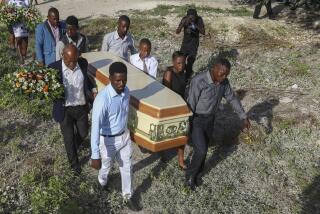More Than 100 Killed in Algerian Massacres
- Share via
ALGIERS — Algeria’s bloody insurgency showed no sign of abating despite one militant group’s cease-fire, with witnesses Saturday reporting 105 people killed in a 48-hour spree of massacres and bombings.
Four days after the Islamic Salvation Army began its truce, attacks characteristic of the rival Armed Islamic Group targeted schools, apartment buildings and a wedding, with dozens of children among the victims.
Many residents of Blida, a garrison town 30 miles south of Algiers, fled their homes Friday night after assailants attacked with homemade rockets and bombs, killing 10 people and injuring 20, according to hospital sources and witnesses.
Security forces there staged a counterattack with helicopters, but it was not immediately known if there were any casualties.
Groups of men armed with guns and sharp-edged weapons killed 75 others--including 34 children--in two massacres early Friday, and a third group slaughtered 20 members of a wedding party Thursday night, witnesses said.
As usual, there was no immediate government confirmation of the killings and no immediate claim of responsibility, but suspicion fell on the Islamic militants whose 5 1/2-year insurgency has left more than 75,000 people dead.
The assailants in Blida cut electrical power to the neighborhoods they targeted before launching their assault, said witnesses interviewed at a train station in Algiers on Saturday morning. Most spoke on condition of anonymity out of fear of reprisal.
The independent daily Liberte said the bombing targets included schools. Hospital sources said the attack took place in central Blida.
Just after the attack, army helicopters bombarded the neighborhood for 20 minutes, said Farida Slimani, 22, a medical student whose house was destroyed in the militants’ rocket attack.
Blida is a stronghold of the Armed Islamic Group, Algeria’s most violent rebel faction, which has ignored the cease-fire called by its weaker rival, the Islamic Salvation Army.
The insurgency began after the military canceled a 1992 parliamentary election runoff that Islamic fundamentalist parties were poised to win. The militants want to overthrow the government and establish a state based on Koranic law.
More to Read
Sign up for Essential California
The most important California stories and recommendations in your inbox every morning.
You may occasionally receive promotional content from the Los Angeles Times.













